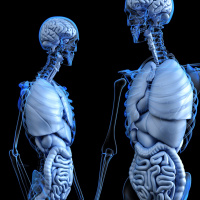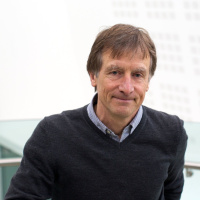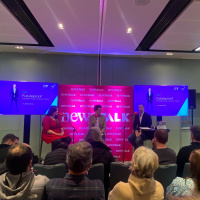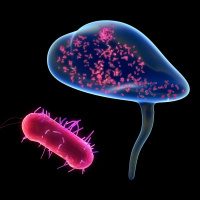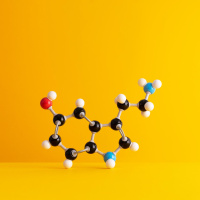Synopsis
Jonathan McCrea brings you the latest developments from the world of Science and Technology from robotics in warfare to artificial lifeforms and beyond
Episodes
-
Best of 2023 - Why Can't we Breathe Underwater?
31/12/2023 Duration: 18minOne of the best conversations from 2023: Ryan Kerney, organismal biologist at Gettysburg University, joined Jonathan to discuss why humans can’t breath underwater and what the likelihood is of us ever developing that ability again.
-
Best of 2023 - Can we Live on Mars?
31/12/2023 Duration: 17minThe notion of human beings getting to and settling on Mars has been a staple of science fiction for decades.But what are the social, scientific, and engineering constraints for establishing a colony, and what are the current blueprint and design concepts for the settlement of an entire Martian city?Justin Hollander, Urban Planning Professor at Tufts University and the author of ‘The First City on Mars: An Urban Planner’s Guide to Settling the Red Planet’ joins Jonathan to discuss.https://jholla03.pages.tufts.edu/
-
How can Humans Survive Extreme Cold?
24/12/2023 Duration: 18minProfessor Mike Tipton from the University of Portsmouth joins Jonathan to discuss the effect of the extreme cold on our bodies and how we try to stay warm.
-
The Atmospheric Phenomenom: STEVE
24/12/2023 Duration: 31minClaire Gasque, physics graduate at the University of California, Berkeley, joins Jonathan to discuss the mysterious atmospheric phenomenon only known as STEVE.Also joining Jonathan for the Newsround is Dr Ruth Freeman from Science Foundation Ireland and Shane Bergin from UCD to look back on 2023's biggest science stories.Image by Elfiehall - Own work, CC BY-SA 4.0, https://commons.wikimedia.org/w/index.php?curid=58633661
-
Futureproof Extra: How your organs can be a different age to the rest of your body
19/12/2023 Duration: 11minDid you know that your organs can be a different age than your body? Jonathan is joined by Jarod Rutledge, longevity scientist and Stanford Excellence Bridging Fellow to discuss what this means.
-
Creating VR goggles for mice
17/12/2023 Duration: 34minIf you’ve ever experimented with VR, you know it can trick your brain into thinking that what you see is real.But in the United States, they are taking this technology to a whole new level – a minuscule one. Scientists there have created miniature VR goggles for mice to wear, but why?Professor Daniel Dombeck, Department of Neurobiology, at Northwestern University, joins Jonathan to discuss.Also joining Jonathan for this week's Newsround is Lianne Shanley, PhD Researcher from the School of Biochemistry and Immunology, Trinity College Dublin & Dr. Ruth Freeman from Science Foundation Ireland.
-
The Potential of Functional Foods
12/12/2023 Duration: 16minJonathon is joined by Prof. Daniel Granato, course director for Functional Foods and Product Development at the University of Limerick to discuss functional foods and what benefits they can give to us.
-
The Benefits of Hypoxia Training with Prof. Phil Jakeman
10/12/2023 Duration: 17minHypoxia training could help patients at risk of health complications ahead of surgery, scientists at the University of Limerick have found. Joining Jonathan to discuss more is Professor Phil Jakeman, Professor of Sport and Exercise Sciences at UL.
-
Futureproof Extra: How leaves form their shapes
05/12/2023 Duration: 14minLeaves have many different jobs: photosynthesis, gas exchange, water exchange, and more. But how do they end up in the shapes that they are? Joining Jonathan to discuss is Dr Katie Gray Ferris, Assistant Professor in the Department of Ecology and Evolutionary Biology at Tulane University in the United States.
-
The importance of scepticism in science
03/12/2023 Duration: 33minFor centuries we have been marketed and sold products that claim extraordinary things only to find out that the evidence and application don’t match up.So-called snake oil products have littered the internet recently and despite pretty clear regulations, the internet has turned on the firehose when it comes to advertising and marketing, to the point where regulators can’t keep up.So, to protect ourselves we should be developing a sceptical approach, so says Nick Teller, the author of 'The Skeptic’s Guide to Sports Science' - he joins Jonathan to discuss.Also joining Jonathan for Newsround is Catherine McGuinness, Research and Education Officer at Cavan County Museum & Lianne Shanley, PhD Researcher from the School of Biochemistry and Immunology, Trinity College Dublin.
-
Futureproof Extra: Where do we save our memories?
28/11/2023 Duration: 16minOur brain has about 86 billion neurons making it a pretty busy place but how much of that space is dedicated to storing our memories and where exactly does that happen? Joining Jonathan to get a better understanding of how we store memories is Tomás Ryan, Associate Professor in Trinity’s School of Biochemistry and Immunology, Trinity Biomedical Sciences Institute, and the Trinity College Institute of Neuroscience.
-
Should we delay clamping the umbilical cord?
26/11/2023 Duration: 39minJoining Jonathan to discuss new research that indicates that a delay in clamping the umbilical cord of premature babies could decrease the risk of death by as much as two-thirds is Professor Eugene Dempsey, Horgan Chair in Neonatology at the INFANT Centre at UCC.Also joining Jonathan for Newsround is physicist, Philip Smyth, and sustainable food production scientist, Laura Healy.
-
Science Week Special: What are the biggest threats to humanity?
19/11/2023 Duration: 57minWhen it comes to the end of humanity, there are numerous ways it might come to pass - be it a wayward asteroid, the eruption of a super volcano, the ever-growing presence of Artificial Intelligence in our lives, or the unseen spores of a killer fungus. But which one of these poses the greatest risk? This is the question posed by Jonathan in this very special episode of Futureproof which was recorded in front of a live audience at the Dublin Royal Convention Centre.Joining us to discuss is:Dr. Robert Ross, Senior Lecturer in the School of Computer Science at TU DublinProfessor Chris Bean, Senior Professor and Head of Geophysics at the Dublin Institute for Advanced StudiesProfessor Caitriona Jackman, Senior Professor of Space Physics at Dunsink ObservatoryJerry Clancy, PhD student at the School of Chemical Sciences in DCUDr. Shane Bergin, physicist and an assistant professor in science education at UCD's School of Education & Immunologist, Dr. Lara Dungan, also join Jonathan for this week's Newsround.With
-
Futureproof Extra: Exploring why UTIs persist with artificial bladders
14/11/2023 Duration: 14minThere are around 400 million global cases of UTIs or urinary tract infections per year, and they can often persist, but why? Researchers in the UK have been using artificial bladders to find out what makes them stick around. Joining Jonathan to discuss is Prof Jennifer Rohn, Professorial Research Fellow in Renal Medicine at University College London and Head of the Centre for Urological Biology.
-
EIRSAT-1: Ireland’s first satellite set for launch
12/11/2023 Duration: 32minThe Educational Irish Research Satellite 1 (EIRSAT-1) is set for launch in November, which will make it Ireland’s first venture into space. To discuss, Jonathan is joined by Dr. David McKeown, Assistant Professor/Lecturer in the School of Mechanical and Materials Engineering at UCD, and the Engineering Manager for the EIRSAT-1 project.For this week's episode of Newsround, Jonathan is joined by Dr Oran Kennedy, Associate Professor of Anatomy and Regenerative Medicine, RCSI & Dr. Fergus McAuliffe, Communications and Public Engagement Manager at iCRAG, the Science Foundation Ireland Research Centre for Applied Geosciences.
-
Best of Futureproof: Why You Can't Focus
05/11/2023 Duration: 19minOn this episode of Futureproof, Jonathan McCrea interviews Johann Hari, author of ‘Stolen Focus: Why You Can't Pay Attention'.
-
Futureproof Extra: The problem with 'Forever Chemicals'
31/10/2023 Duration: 14minSynthetic compounds are found in a multitude of items that we manufacture. They can help us create newfound or superior chemical composites that go into the everyday items we take for granted like non-stick and water-resistant materials. But these synthetic compounds are now being detected in drinking water sources worldwide, being dubbed ‘Forever Chemicals’.So, what can be done about it?Dr. Ruairí Brannigan, Assistant Professor in the School of Chemical Sciences at DCU joins Jonathan to discuss.
-
Nature’s most effective and delicious toxins
29/10/2023 Duration: 42minProf. Noah Whiteman has been exploring the secrets of nature’s toxins, how they evolved, and how we use them. Noah is Professor of Genetics, Genomics, Evolution, and Development and Director of the Essig Museum of Entomology at UC-Berkeley and author of ‘Most Delicious Poison: The Story of Nature's Toxins - From Spices to Vices’ - he joins Jonathan to discuss.Also joining Jonathan for Newsround is Dr. Lara Dungan and Dr. Oran Kennedy from RCSI.
-
Futureproof Extra: Pigments in the fossil record & the medical applications of Biophotonics
24/10/2023 Duration: 27minWhy is your cat ginger or black? Often it comes down to a very small type of pigment that scientists in Cork have been examining to learn more about the colourisation of ancient animals. Joining Jonathan to discuss is Dr Tiffany Slater, Palaeobiologist at UCC who is interested in the preservation of ancient biomolecules.Also on the programme, did you know you can use light to detect specific cells in the body? Professor Stefan Andersson-Engles is the Head of Biophotonics and Deputy Director of IPIC based at the Tyndall National Institute and is also a Professor of Physics at University College Cork who has just been awarded a €5.3 million grant by Science Foundation Ireland to further investigate the application of light-based technologies. He joins Jonathan to discuss.
-
Does free will exist?
22/10/2023 Duration: 18minWhen it comes to free will, we think of our ability to independently make decisions based on our own desires or interests. That being said, there are those who say that we are the mere conscious witnesses of decisions that, deep in our brains, have already been made. Our guest argues that we are not mere vessels responding to physical forces, but agents acting with purpose. Kevin J. Mitchell is Associate Professor of Genetics and Neuroscience at Trinity College Dublin and author of ‘Free Agents – How Evolution Gave Us Free Will’.





